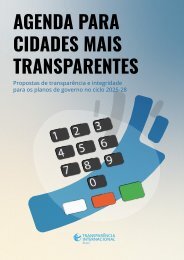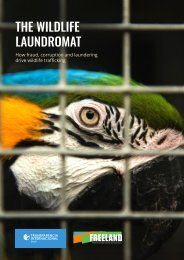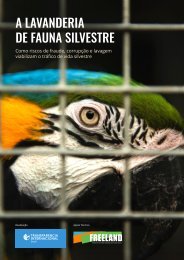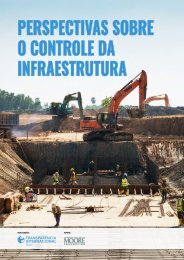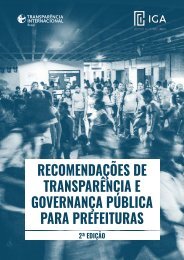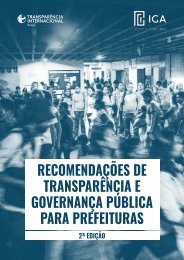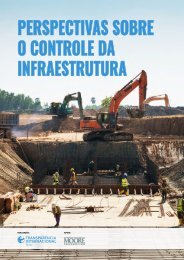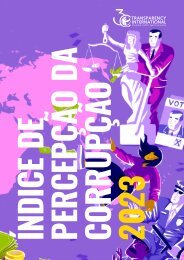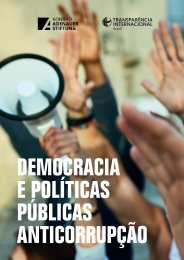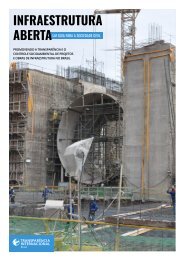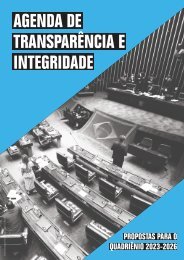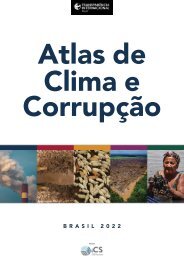Brazil Annual Review - 2019
You also want an ePaper? Increase the reach of your titles
YUMPU automatically turns print PDFs into web optimized ePapers that Google loves.
BRAZIL<br />
ANNUAL<br />
REVIEW<br />
<strong>2019</strong>
Author | Guilherme France<br />
Researchers | Dário Machado, Guilherme Donega, Maria Dominguez, Renato Morgado, Vinicius Reis<br />
<strong>Review</strong>ers | Bruno Brandão, Maíra Martini<br />
Graphic Designer | Rafael Regatieri<br />
This report draws extensively on other studies previously conducted by Transparency International, such as <strong>Brazil</strong>:<br />
overview of corruption and anti-corruption and <strong>Brazil</strong>: setbacks in the legal and institutional anti-corruption<br />
frameworks.<br />
Every effort has been made to verify the accuracy of the information contained in this report. All information was<br />
believed to be correct as of January 2020. Nevertheless, Transparency International <strong>Brazil</strong> cannot accept responsibility<br />
for the consequences of its use for other purposes or in other contexts. Revised edition January 24th.<br />
2020 Transparency International - <strong>Brazil</strong>. Except where otherwise noted, this work is licensed under CC BY-ND 4.0<br />
DE. Quotation permitted. Please contact Transparency International - <strong>Brazil</strong> – brasil@br.transparency.org – regarding<br />
derivatives requests.<br />
<strong>Brazil</strong> <strong>Annual</strong> <strong>Review</strong> <strong>2019</strong>: ISBN nº 978-65-990735-1-9<br />
www.transparenciainternacional.org.br
TABLE OF<br />
CONTENTS<br />
09<br />
FEDERAL<br />
GOVERNMENT<br />
CORRUPTION<br />
ALLEGATIONS<br />
POLITICAL<br />
INTERFERENCE<br />
ANTI-<br />
CORRUPTION<br />
POLICIES<br />
FINANCIAL<br />
INTELLIGENCE<br />
UNIT<br />
17<br />
NATIONAL<br />
CONGRESS<br />
ABUSE OF<br />
AUTHORITY<br />
LAW<br />
ELECTIONS AND<br />
POLITICAL<br />
PARTIES<br />
ANTI-<br />
CORRUPTION<br />
PACKAGE<br />
FEDERAL<br />
COURT OF<br />
ACCOUNTS<br />
OTHER<br />
MATTERS<br />
25<br />
COURTS<br />
ANTI-<br />
MONEY<br />
LAUNDERING<br />
LAW<br />
ENFORCEMENT<br />
FAKE<br />
NEWS<br />
INQUIRY
BRAZIL ANNUAL REVIEW <strong>2019</strong><br />
31<br />
PROSECUTOR’S<br />
OFFICE<br />
LAW<br />
ENFORCEMENT<br />
35<br />
CIVIL<br />
SOCIETY<br />
AND<br />
THE<br />
PRESS<br />
39<br />
RECOMMEN<br />
-DATIONS
BRAZIL ANNUAL REVIEW <strong>2019</strong><br />
INSTEAD OF<br />
PROGRESS,<br />
RESISTANCE.<br />
INSTEAD OF<br />
REFORMS,<br />
SETBACKS.<br />
This was the motto for the anti-corruption agenda in <strong>Brazil</strong><br />
during the course of <strong>2019</strong>. High expectations were met with<br />
few accomplishments. Corruption was one of the main issues<br />
for voters during the 2018 elections and remains one of the<br />
biggest problems for <strong>Brazil</strong>ians. President Bolsonaro and a host<br />
of members of Parliament were elected based on their promises to<br />
deal with the issue and implement effective reforms. Not only have<br />
they failed to do that, but, along with the Supreme Court, they have<br />
dealt several blows to the country’s anti-corruption framework.<br />
There are a number of reform proposals on the table, chief<br />
among them the “New Measures against Corruption”, a package<br />
of anti-corruption legislation developed by the <strong>Brazil</strong>ian society.<br />
Throughout the year, however, instead<br />
of discussing and improving upon<br />
these reforms, public officials across<br />
all branches of power challenged and<br />
undermined some of the most basic<br />
anti-corruption tools. For example, the<br />
president of the Supreme Court halted<br />
the ability of the country’s Financial<br />
Intelligence Unit to share information<br />
on suspicious transactions with law<br />
enforcement agents, something that<br />
has been done for over 20 years.
Photo: Davidsonluna / Unsplash<br />
While working at the federal level proved<br />
challenging, the potential for promoting<br />
integrity and transparency at the subnational<br />
level has never been clearer.<br />
States and municipalities provide basic<br />
services to the population, such as<br />
education and healthcare. Corruption<br />
at those levels, thus, produces a direct<br />
impact on the most vulnerable members<br />
of society, aggravating inequality<br />
and social injustice. Transparency<br />
International <strong>Brazil</strong> decided to take this<br />
opportunity to work together with state<br />
governments in order to design and implement State Integrity<br />
Plans, with the overarching goal of strengthening their corruption<br />
prevention, detection, and repression tools.<br />
This yearly review aims to highlight the most significant<br />
developments for the anti-corruption agenda in <strong>Brazil</strong>. It is<br />
organized into five main chapters dealing with all branches<br />
of power - Executive, Legislative, and Judiciary - and with the<br />
Prosecutor’s Office, the press, and civil society. For each chapter,<br />
positive and negative developments are presented, including, but<br />
not restricted to, new legislations, judicial rulings, administrative<br />
decisions, and corruption scandals. The report finalizes with a<br />
set of recommendations by Transparency International.
FEDERAL<br />
GOVERNMENT<br />
section 01<br />
President Jair Bolsonaro campaigned heavily on an anti-corruption platform. However, the<br />
first year of the recent elected government showed limited progress on the implementation<br />
of an anti-corruption agenda. Neither were the promises to maintain a zero-tolerance<br />
policy towards corruption kept. Besides, a series of decisions made by the executive<br />
branch of the federal government show signs of political interference in key corruptionfighting<br />
bodies, such as the Federal Police, the Federal Revenue Service, and the Public<br />
Prosecutor’s Office. Positive actions so far have been limited to the establishment of<br />
stricter rules for political appointments, criminal investigations, led by the Federal Police,<br />
into numerous corruption schemes, and institutional development and capacity building<br />
prompted by the Office of the Comptroller-General and the Ministry of Justice.<br />
08<br />
Transparência Internacional - Brasil
Photo: José Cruz / Agência Brasil<br />
a series of decisions made by the<br />
executive branch of the federal<br />
government show signs of political<br />
interference in key corruption-fighting<br />
bodies, such as the Federal Police,<br />
the Federal Revenue Service,<br />
and the Public Prosecutor’s Office<br />
<strong>Brazil</strong> <strong>Annual</strong> <strong>Review</strong> <strong>2019</strong><br />
09
CORRUPTION<br />
ALLEGATIONS<br />
During the past year, corruption allegations tainted some of<br />
President Bolsonaro’s close allies and family members, and little<br />
action was taken to distance them from positions of power or<br />
the president’s inner circle.<br />
In February, allegations arose around the involvement of Marcelo<br />
Álvaro Antônio, a Congressman and Minister for Tourism, in a<br />
corruption scheme in Minas Gerais. As the President of his party<br />
in the state, Mr. Antônio allegedly diverted campaign funds from<br />
the women candidates, who were supposed to receive, at least,<br />
30 percent of the resources. There were allegations that he also<br />
selected women to run for office as “ghost candidates” in order<br />
to use their campaign funds to his benefit. Finally, he’s also said to<br />
have threatened some of the women candidates to avoid having<br />
them testify against him. In October, Mr. Antônio was charged for<br />
falsification, criminal association, and fraud. Notwithstanding the<br />
charges, Mr. Antônio has remained in office as Minister for Tourism.<br />
In May, Senator Fernando Bezerra Coelho, the leader of the<br />
government in the Senate, had his assets frozen as part of an<br />
investigation in which he is accused of having received bribes from<br />
construction companies in exchange for supporting their interests<br />
while working in Pernambuco government. Notwithstanding, he<br />
has remained the leader of the government in the Senate.<br />
In October, the president of the Liberal and Social Party (PSL),<br />
Congressman Luciano Bivar, became the subject of investigations<br />
over the misuse of campaign funds that should have been<br />
directed at women candidates in his state of Pernambuco. PSL<br />
was President Bolsonaro’s party during the 2018 elections.<br />
Since the end of 2018, Senator Flavio<br />
Bolsonaro, the president’s son, has<br />
been under investigation for allegedly<br />
receiving back part of the salary of<br />
his cabinet employees while a State<br />
Congressman in Rio de Janeiro, between<br />
2007 and 2018. Some of them were<br />
allegedly “ghost” employees who never<br />
effectively worked in the Rio de Janeiro<br />
State Assembly. Along with his chief of<br />
staff, Fabrício Queiroz, Flavio is said to<br />
have received more than 2 million reais<br />
(500 thousand dollars) in structured cash<br />
deposits. Investigators suspect that Flavio<br />
concocted a money laundering scheme<br />
using real estate and a candy shop. There<br />
are also a number of other, unrelated,<br />
investigations into the Bolsonaro family.<br />
Beyond these investigations, a number of<br />
reports arose on the widespread nepotism<br />
practiced by President Bolsonaro and<br />
his three sons while holding public<br />
offices in Rio de Janeiro and Brasília.<br />
The latest example was the move by<br />
President Bolsonaro to appoint his son,<br />
Congressman Eduardo Bolsonaro, to be<br />
Ambassador to the United States.<br />
Photos: 1- Valter Campanato / Agência Brasil | 2- Antonio<br />
Cruz / Agência Brasil | 3- Marcelo Camargo / Agência Brasil<br />
4- Fabio Rodrigues Pozzebom / Agência Brasil<br />
10 Transparência Internacional - Brasil
Photo: Marcello Casal Jr / Agência Brasil<br />
POLITICAL<br />
INTERFERENCE<br />
Political interference seemed to have<br />
played a role in nominations and<br />
dismissals in positions key for anticorruption<br />
efforts.<br />
During <strong>2019</strong>, for example, political<br />
interference in the Federal Police grew,<br />
provoking unrest among investigators,<br />
detectives, and directors. In August,<br />
President Bolsonaro removed Ricardo<br />
Saadi from the position of head of the<br />
regional office in Rio de Janeiro, leading<br />
police chiefs to threaten mass resignations.<br />
Mr. Bolsonaro declared that the move<br />
was motivated by “performance issues.”<br />
However, internal assessments by the<br />
Federal Police revealed that during Mr.<br />
Saadi’s administration, the state of Rio<br />
de Janeiro moved from the 24th to the<br />
fourth best-performing unit among<br />
<strong>Brazil</strong>ian states. He has also threatened<br />
to fire Mauricio Valeixo, the Federal Police’s<br />
Director-General, who had been chosen by<br />
Minister of Justice Sérgio Moro.<br />
At the Federal Revenue Service (Receita Federal do Brasil, RFB),<br />
which is also responsible for combating tax evasion and, in that<br />
capacity, collaborates intensively with other law-enforcement<br />
agencies in the fight against corruption and money laundering, there<br />
were three significant changes in its upper hierarchy. Marcos Cintra,<br />
the Secretary-General, and João Paulo Ramos Fachada Martins<br />
da Silva, the Deputy Secretary-General, were both dismissed in<br />
September and August, respectively. President Bolsonaro also fired<br />
Ricardo Pereira Feitosa, Head of Fiscal Intelligence of the RFB, in<br />
charge of cooperating with and sharing information with other<br />
law-enforcement agencies.<br />
While the changes may have had different motivations, including<br />
divergences on policy decisions, Mr. Bolsonaro’s dissatisfaction<br />
with the RFB has been notorious. He has publicly expressed his<br />
displeasure, accusing the RFB of targeting his family’s businesses<br />
with excessive scrutiny. Even a fine imposed on a small tax<br />
irregularity committed by his brother has been brought up as<br />
justification for such disgruntlement.<br />
There were also other reports of politically motivated interference<br />
in key posts. Efforts were to replace the customs official in charge<br />
of Itaguaí Port – one of the country’s busiest points of entry and<br />
exit for imports and exports, including drugs and illegal arms –<br />
as well as the head of Rio de Janeiro’s RFB Office. The potential<br />
assignment of political appointees to these posts aggravated the<br />
tensions between RFB civil servants and the president.<br />
<strong>Brazil</strong> <strong>Annual</strong> <strong>Review</strong> <strong>2019</strong> 11
Photo: Marcello Casal Jr / Agência Brasil<br />
Roberto Leonel de Oliveira Lima, President of the Conselho de<br />
Controle de Atividades Financeiras (COAF) – <strong>Brazil</strong>’s Financial<br />
Intelligence Unit – was dismissed, according to reports,<br />
because of his criticism of a Supreme Court ruling paralyzing<br />
the institution’s activities. Mr. Oliveira Lima was an experienced<br />
tax auditor who specialised in money laundering investigations,<br />
having acted for four years in the Carwash Taskforce.<br />
President Bolsonaro, in August, broke with<br />
tradition and chose Augusto Aras as Prosecutor-<br />
General, a prosecutor who had not competed<br />
in the internal elections organized among<br />
career prosecutors.<br />
The Council on Defence of Economic Activities, <strong>Brazil</strong>’s main<br />
antitrust body, was emptied and unable to fulfil its legal role.<br />
Between July and October, the Council, which is composed of<br />
seven members, had only three active commissioners, making<br />
it impossible for it to conduct its proceedings. The political<br />
interference became evident when President Bolsonaro withdrew<br />
the nominations of the two new commissioners selected by the<br />
Ministers of the Economy and of Justice, both with recognized<br />
expertise in the fields of Law and Economics.<br />
President Bolsonaro, instead, appointed new names negotiated with<br />
Senators, in what was reported to be a political bargain to obtain<br />
support for the nomination of one of his<br />
sons, Congressman Eduardo Bolsonaro, as<br />
<strong>Brazil</strong>’s Ambassador to the United States.<br />
Beyond questions on the political<br />
appointment of officials within the<br />
Executive branch, it should also be noted<br />
that President Bolsonaro, in August,<br />
broke with tradition and chose Augusto<br />
Aras as Prosecutor-General, a prosecutor<br />
who had not competed in the internal<br />
elections organized among career<br />
prosecutors. Mr. Aras was confirmed by<br />
the Senate and has taken office as Head<br />
of the Prosecutor’s Office.<br />
The process for appointing the Head<br />
of <strong>Brazil</strong>’s Public Prosecutors’ Office<br />
leadership is highly political – it is an<br />
exclusive responsibility of the President<br />
to appoint the Prosecutor-General,<br />
among career prosecutors, subject to the<br />
Senate’s approval. Since 2003, however,<br />
an important tradition gained ground. The<br />
President would appoint the Prosecutor-<br />
General from a shortlist of names chosen<br />
through an election process organized<br />
by the National Association of Federal<br />
Prosecutors. This practice became an<br />
efficient way to select names that were<br />
well regarded internally and to increase<br />
the institution’s independence.<br />
12<br />
Transparência Internacional - Brasil
ANTI-<br />
CORRUPTION<br />
POLICIES<br />
In January, Vice-President Hamilton<br />
Mourão signed a decree which would<br />
dramatically increase the number<br />
of public officials, within the federal<br />
government, able to declare an<br />
information to be confidential and, thus,<br />
not available to the public. More than<br />
one thousand people would potentially<br />
gain that power, threatening to reduce<br />
the transparency of public information<br />
across the whole government.<br />
In March, President Bolsonaro signed<br />
a decree setting restrictions to the<br />
appointment to commissioned and<br />
trust positions – usually political<br />
appointees – in the <strong>Brazil</strong>ian federal<br />
bureaucracy. According to the new rule,<br />
whoever is ineligible according to the<br />
criteria established by the Clean Record<br />
Law (‘Lei da Ficha Limpa’) cannot be<br />
nominated to those positions. Also,<br />
the Decree requires an unblemished<br />
reputation and previous professional and<br />
academic experiences of relevance. In<br />
July, the President signed another decree<br />
(9.916/<strong>2019</strong>) widening the reach of<br />
these restrictions to other positions in<br />
the federal administration.<br />
In a move that has yet to come to<br />
fruition, the Office of the Comptroller<br />
General (CGU) drafted a decree proposal<br />
that would partially regulate lobbying for<br />
the Executive branch.<br />
In <strong>2019</strong>, the Office of the Comptroller General (CGU) was<br />
responsible for important initiatives to prevent, detect, and<br />
fight corruption. In order to consolidate preventive action, there<br />
were measures for the development of Ombudsman’s Offices<br />
and Sanctioning Offices on federal, state, and municipal levels.<br />
This was accompanied by efforts to guarantee the protection<br />
of whistleblowers and to further develop digital platforms such<br />
as Fala.BR, allowing more effective response to corruption<br />
complaints. Furthermore, the CGU offered capacity-building<br />
programs to foster integrity in the public and private sectors. As a<br />
way to detect corruption, the agency enhanced its auditing system<br />
for public bids and its risk-assessment tool for partnerships<br />
involving other levels of government. The CGU also joined federal<br />
and state-level agencies in 58 special operations in different<br />
areas, such as healthcare, transportation, and education.<br />
According to the new rule, whoever is ineligible<br />
according to the criteria established by the<br />
Clean Record Law (‘Lei da Ficha Limpa’)<br />
cannot be nominated to those positions.<br />
Also, the Decree requires an unblemished<br />
reputation and previous professional and<br />
academic experiences of relevance.<br />
Leniency agreements have been signed between a host of<br />
companies (Braskem, Technip, Flexibras, Camargo Correa, Nova<br />
Participações, and OAS) and the Office of the Comptroller General<br />
(CGU) and the General Attorney of the Republic (AGU). They totaled<br />
payments of around 7.5 billion reais (1.8 billion dollars).<br />
<strong>Brazil</strong> <strong>Annual</strong> <strong>Review</strong> <strong>2019</strong> 13
Photo: Vinícius Mendonça / Ibama<br />
In December, President Bolsonaro signed a<br />
Provisional Measure allowing for the legalization<br />
of lands (illegally) occupied before 2018.<br />
In June, after years of delay, the Federal<br />
Revenue Services started requiring<br />
the register of beneficial owners from<br />
companies, a measure that, while still<br />
insufficient, mostly because the register<br />
has not been made public, will help<br />
combat money laundering and provide<br />
information to assist prosecutors in<br />
corruption-related investigations.<br />
They totaled payments<br />
of around 7.5 billion reais<br />
(1.8 billion dollars).<br />
In April, President Bolsonaro signed a<br />
Provisional Measure – dubbed Economic<br />
Freedom – on debureaucratization. It<br />
was approved by Congress and enacted<br />
into law in September. While there are<br />
many controversial aspects, there is<br />
potential for it to reduce corruption since<br />
it digitalizes certain procedures.<br />
During <strong>2019</strong>, the Ministry of Justice<br />
was able to restructure the REDE-<br />
LAB, a national network of technology<br />
labs for the detection of moneylaundering<br />
schemes. It also fostered<br />
the implementation of 29 police units<br />
specialized in anti-corruption efforts in<br />
18 <strong>Brazil</strong>ian states. The Federal Police<br />
was also strengthened with the hiring<br />
of an additional 1,200 agents.<br />
Several important investigations have been conducted by<br />
the Federal Police into corruption schemes across <strong>Brazil</strong>.<br />
Operations Pé de Barro, Calvário, and Faroeste are three of<br />
note. Operation Faroeste, for example, uncovered a scheme,<br />
in which magistrates took bribes to rule in favor of farmers<br />
to recognize land-grabbed areas as their property. It resulted<br />
in over 3,600 km² of illegally-seized land. Besides lawyers,<br />
public servants, and farmers, several judges in the State of<br />
Bahia, including the president of the state’s court, were also the<br />
target of the operation, many of them arrested and temporarily<br />
removed from office.<br />
On the environmental front, however, the federal government’s<br />
actions during <strong>2019</strong> may have facilitated the work of criminal<br />
organizations responsible for illegal deforestation, illegal logging,<br />
and land grabbing. The <strong>Brazil</strong>ian Institute of the Environment<br />
and Renewable Natural Resources (IBAMA) – the federal public<br />
agency responsible for combating environmental crimes – was<br />
drastically weakened by Ricardo Salles, the Minister of the<br />
Environment. For example, throughout the year, IBAMA applied<br />
the lowest number of environmental fines in 15 years, even<br />
though deforestation reached a peak not seen since 2008.<br />
The Federal Police was also strengthened<br />
with the hiring of an additional 1,200 agents.<br />
In December, President Bolsonaro signed a Provisional Measure<br />
allowing for the legalization of lands (illegally) occupied before<br />
2018. This measure promoted impunity in regard to land<br />
grabbing, which is one of the biggest causes of deforestation in<br />
the Amazon and a hotspot for corruption. It further encouraged<br />
the illegal occupation of public lands, many of them on<br />
environmentally protected areas and Indigenous reserves.<br />
14 Transparência Internacional - Brasil
FINANCIAL<br />
INTELLIGENCE UNIT<br />
One of President Bolsonaro’s first acts in<br />
office, back in January, was to implement<br />
a change to the institutional framework<br />
upon which the Conselho de Controle de<br />
Atividades Financeiras (COAF) – <strong>Brazil</strong>’s<br />
Financial Intelligence Unit – rests. It<br />
had been, since its founding in 1998,<br />
a part of the Ministry of the Economy,<br />
from where it played an important role<br />
in providing financial intelligence related<br />
to corruption cases. Provisional Measure<br />
nº 870, however, transferred the COAF to<br />
the structure of the Ministry of Justice.<br />
Provisional Measures are immediately<br />
enacted, but are subject to Congress’<br />
confirmation. The COAF was thus<br />
transferred to the Ministry of Justice, where<br />
it remained until May, when Congress<br />
revoked its transfer and reinstated the<br />
previous framework, with the COAF<br />
returning to the Ministry of the Economy.<br />
Press reports associated the Congress’<br />
decision against the placement of COAF<br />
in the Ministry of Justice with the strong<br />
opposition shared by Congress members<br />
toward Minister Sérgio Moro, the former<br />
Carwash judge who helmed the transfer.<br />
Following the defeat in Congress, President<br />
Bolsonaro enacted another Provisional<br />
Measure (893), which transferred the COAF<br />
to the Central Bank, under the argument<br />
that this would reduce political interference<br />
in the organization. However, the bill of<br />
law that would grant autonomy to the<br />
Central Bank (and a fixed 4-year term to<br />
its president) is currently being discussed<br />
in Congress, with little indication that it<br />
will be approved. A recent best practices comparative study by<br />
Transparency International also shows that this arrangement is a<br />
highly unusual institutional design choice.<br />
Although some aspects regarding the COAF’s new normative<br />
structure initially raised some concerns, Congress addressed<br />
them and the legislation put in place to (re)organize the COAF<br />
within the Central Bank’s structure is largely adequate, though<br />
the Financial Action Task Force has yet to analyze the final<br />
result of the legislative process. An issue that will likely draw<br />
the FATF’s attention, and potentially reopen discussions on<br />
the subject, is that Congress excluded the responsibility of<br />
combating the financing of terrorism from the COAF’s mission.<br />
section 01 - ups & downs<br />
President Bolsonaro signed a decree setting restrictions to the<br />
appointment to commissioned and trust positions – usually<br />
political appointees – in the <strong>Brazil</strong>ian federal bureaucracy.<br />
The Federal Police was strengthened with the hiring of an<br />
additional 1,200 agents and it led important investigations into<br />
corruption schemes across <strong>Brazil</strong>, such as Operations Pé de<br />
Barro, Calvário, and Faroeste.<br />
The Ministry of Justice and Public Security fostered the<br />
implementation of 29 police units specialized in anti-corruption<br />
efforts in 18 <strong>Brazil</strong>ian states.<br />
The Office of the Comptroller General (CGU) fomented the<br />
improvement of the Ombudsman system on federal, state, and<br />
municipal levels and enhanced the protection of whistleblowers.<br />
Corruption allegations tainted some of President Bolsonaro’s<br />
close allies and family members, and little action was taken<br />
to distance them from positions of power or the president’s<br />
inner circle.<br />
Political interference seemed to have played a role in nominations<br />
and dismissals in positions key for anti-corruption efforts.<br />
<strong>Brazil</strong>’s Financial Intelligence Unit has gone through a year of<br />
tremendous instability and having been housed at the Ministry of<br />
Justice, the Ministry of Economy, and, finally, at the Central Bank.<br />
President Bolsonaro signed a Provisional Measure allowing for<br />
the legalization of lands (illegally) occupied before 2018, a move<br />
that promoted impunity in regard to land grabbing.<br />
The Government failed to propose and defend in Congress an<br />
ambitious set of anti-corruption reforms, one that could tackle<br />
the structural causes of <strong>Brazil</strong>’s systemic corruption.<br />
<strong>Brazil</strong> <strong>Annual</strong> <strong>Review</strong> <strong>2019</strong><br />
15
section 02<br />
NATIONAL<br />
CONGRESS<br />
Despite high expectations for a renewed Congress, for which<br />
many Federal Deputies and Senators were elected on anticorruption<br />
platforms, there have been few concrete advances on<br />
this issue. On the other hand, a host of new legislations have been<br />
approved that threaten a decades-long process of strengthening<br />
<strong>Brazil</strong>’s anti-corruption legal and institutional framework.<br />
16<br />
Transparência Internacional - Brasil
Photo: Pedro França / Agência Senado<br />
<strong>Brazil</strong> <strong>Annual</strong> <strong>Review</strong> <strong>2019</strong><br />
17
Photo: Engin_Akyurt / Pixabay<br />
ABUSE OF<br />
AUTHORITY<br />
LAW<br />
In September, an abuse of authority law was approved following<br />
a rushed legislative process, which allowed for little discussion<br />
and participation from specialists and affected authorities.<br />
Although the law is generally aimed at public officials who abuse<br />
their powers, its provisions clearly focus on law enforcement<br />
agents, allowing for the criminalization of their regular activities.<br />
There are several vague and undefined provisions in the law,<br />
most of which leave ample room for judges, investigators, and<br />
prosecutors to suffer retaliation from powerful individuals under<br />
investigation for corruption. For example, the law threatens with<br />
1 to 4 years of detention any official who prosecutes a case<br />
“without just cause” (art. 30). Many of these provisions have had<br />
their constitutionality questioned by judges’ and prosecutors’<br />
associations, but the Supreme Court has yet to rule on this matter.<br />
The OECD Working Group on Bribery (WGB) had previously<br />
advised on the risks such legislation posed to the independence<br />
of prosecutors and judges. Following the law’s approval, the<br />
WGB issued a statement in October, noting “that the approval of<br />
a bill introducing an overly broad definition of what constitutes<br />
abuse of authority by judges and prosecutors would have a<br />
significant chilling effect on anti-corruption prosecutions and<br />
investigations in <strong>Brazil</strong> and beyond.” A high-level mission was<br />
There are several vague<br />
and undefined provisions<br />
in the law, most of which<br />
leave ample room for judges,<br />
investigators, and prosecutors<br />
to suffer retaliation from<br />
powerful individuals under<br />
investigation for corruption.<br />
subsequently sent to Brasília in order<br />
to convey, directly, this – among other<br />
concerns 1 – to <strong>Brazil</strong>ian authorities.<br />
While the country does need to address<br />
a severe problem of systemic abuse of<br />
authority, the vague legal text and the<br />
rushed legislative process produced an<br />
inadequate remedy that may better serve<br />
the impunity of powerful defendants<br />
and could provide a tool for retaliation<br />
against law enforcement agents.<br />
1- The WGB also expressed concerns about the impacts of the injunctions of the Supreme Court, which limited the use of reports by Financial<br />
Intelligence Unit, Federal Revenues, and other administrative agencies in criminal investigations. Combined with other actions by the Supreme Court<br />
and the Federal Auditor’s Court, there was a concern that these actions might seriously hamper <strong>Brazil</strong>’s ability to detect and effectively fight corruption.<br />
18 Transparência Internacional - Brasil
ELECTIONS AND<br />
POLITICAL PARTIES<br />
Looking at the 2020 municipal elections,<br />
a comprehensive reform was also<br />
approved by Congress in October on<br />
legislation applicable to political parties<br />
and electoral campaigns. However,<br />
instead of improving upon the current<br />
system, the new law further reduced<br />
transparency and accountability<br />
requirements for political parties,<br />
multiplying the loopholes for illicit<br />
campaign financing. Other changes relate<br />
to the new possibilities for expenditures<br />
using public resources: acquisition and<br />
renovation of party headquarters, real<br />
estate acquisition or rental, sponsored<br />
posts in social media, and airline tickets<br />
This legislation also determined that<br />
political parties should not be treated<br />
by financial institutions as Politically-<br />
Exposed Persons (PEPs). It is an effort to<br />
protect political parties from scrutiny and<br />
additional transparency requirements.<br />
Despite increased societal pressure for President Bolsonaro to<br />
veto it, he has argued, with little supporting evidence, that he’s<br />
legally forbidden from vetoing the bill and sanctioned it in the<br />
beginning of 2020.<br />
However, instead of improving upon the<br />
current system, the new law further<br />
reduced transparency and accountability<br />
requirements for political parties, multiplying<br />
the loopholes for illicit campaign financing.<br />
Special Campaign Fund would<br />
be composed of approximately<br />
US$500mi<br />
It also assured that, for the 2020<br />
elections, political parties and campaigns<br />
will be funded by public resources<br />
distributed between two funds:<br />
a Special Campaign Fund and a<br />
Political Parties Fund. Although<br />
the amount of resources in<br />
each fund remains undefined,<br />
Congress established that the<br />
Special Campaign Fund would<br />
be composed of approximately 500<br />
million dollars and the Party Fund would<br />
receive approximately 230 million dollars.<br />
Photo: Antonio Cruz / Agência Brasil<br />
<strong>Brazil</strong> <strong>Annual</strong> <strong>Review</strong> <strong>2019</strong> 19
ANTI-<br />
CORRUPTION<br />
PACKAGE<br />
In February, an anti-corruption package<br />
was presented by Minister of Justice<br />
Sérgio Moro. That package dealt<br />
with other issues beyond corruption,<br />
such as organized crime and public<br />
security, and was eventually merged,<br />
for consideration by Congress, with<br />
another set of anti-crime propositions<br />
– previously presented by Supreme<br />
Court Justice Alexandre de Moraes.<br />
The package was thus limited in its<br />
anti-corruption dimension and largely<br />
dealt with measures against violent and<br />
organized crimes. It was also particularly<br />
limited when it comes to preventive<br />
measures.<br />
Discussions within a working group<br />
in the House of Representatives took<br />
up most of the year and reconfigured<br />
the package. Finally, a version of<br />
the package was approved by Congress and sanctioned by<br />
President Bolsonaro. It contained, however, few of the provisions<br />
initially included in Moro’s package. Most noticeably for the anticorruption<br />
agenda was the approval of the extended forfeiture<br />
for proceedings from criminal activities.<br />
One other measure in the approved anti-corruption package was<br />
the improvement of the whistleblowing system in the public sector.<br />
It is now mandatory for all bodies of the Public Administration<br />
to maintain an Ombudsman’s Office or a Sanctioning Office,<br />
responsible for receiving reports of illegal conducts and acts that<br />
are contrary to public interest. The law now also establishes<br />
protections regarding the confidentiality of the whistleblower’s<br />
identity and against retaliation and specifies monetary awards<br />
to whistleblowers whose complaints result in asset recoveries.<br />
20 Transparência Internacional - Brasil
Photo: José Cruz / Agência Brasil<br />
Although still timid if compared to whistleblowing legislative<br />
best practices, the new directive seems to be an advancement<br />
towards the right direction. Future improvements in the<br />
legislation should consider protections towards private sector<br />
whistleblowers and further detail protection proceedings.<br />
On the other hand, the newly-instated law also included<br />
provisions that created the so-called “juiz de garantia”<br />
(investigating judge). Basically, it determines that a judge<br />
cannot preside over both the investigations and trial proceedings<br />
of the same case. The goal of this separation of duties is to<br />
ensure the fairness of the trial and to preserve the impartiality<br />
of the judge ruling on the case. Calls for the creation of the<br />
investigating judge intensified due to concerns of excessive<br />
proximity between former Judge Sérgio Moro and Carwash<br />
prosecutors, as revealed by the “Vaza<br />
Jato” leaks. The case helped to shed<br />
light on <strong>Brazil</strong>’s single judge system,<br />
prompting the discussion on reforms<br />
that can secure more distance between<br />
the sentencing judge and prosecutors.<br />
Though this measure has received wide<br />
praise as a necessary criminal justice<br />
reform, it was approved in a rushed<br />
legislative process, without the necessary<br />
studies for the implementation of such<br />
structural reform in the country’s judicial<br />
system. Scheduled to enter into effect in<br />
January 2020, the high costs for hiring<br />
more judges, the risk of increased slowness<br />
in judicial proceedings (and impunity), and<br />
the difficult situation of small cities where<br />
there is usually only one judge are just<br />
some of the concerns that have been raised<br />
since the approval of Law n. 13.964/<strong>2019</strong>.<br />
<strong>Brazil</strong> <strong>Annual</strong> <strong>Review</strong> <strong>2019</strong> 21
FEDERAL<br />
COURT OF<br />
ACCOUNTS<br />
During <strong>2019</strong>, the Federal Court of Accounts<br />
(TCU) did 243 inspections and convicted more<br />
than 2 thousand individuals and 82 companies<br />
for irregularities committed with public funds.<br />
The TCU also replicated the methodology<br />
previously applied for the federal executive<br />
branch and mapped the risks of fraud and<br />
corruption in all public bodies the state of<br />
Mato Grosso do Sul. Moving forward, the<br />
Court has begun the process of applying this<br />
methodology in the whole country.<br />
Photo: Leopoldo Silva / Agência Senado<br />
On the other hand, it also interfered, along<br />
with the Supreme Court (more on that at the<br />
Judiciary section below), with the auditing<br />
performed by the Federal Revenue Services<br />
of Politically-Exposed Persons. Minister Bruno<br />
Dantas requested that the RFB submit details<br />
about all auditing activities on PEPs in the last<br />
five years, including the identification of all civil<br />
servants who had access to the information.<br />
This request was considered to be beyond the<br />
Court of Accounts’ competence and an effort to<br />
intimidate the auditors. Another ruling that has<br />
drawn criticism for its intimidatory purposes was<br />
the request made to the Supreme Court with the<br />
goal of obtaining the leaked messages (from the<br />
Vaza Jato) between one of the TCU’s prosecutors<br />
and members of the Carwash Taskforce.<br />
22 Transparência Internacional - Brasil
OTHER<br />
MATTERS<br />
Beyond these serious setbacks, there has been<br />
a noticeable lack of progress in the passing of<br />
legislation that could have a positive impact on<br />
<strong>Brazil</strong>’s anti-corruption efforts. A bill reforming public<br />
procurement rules was approved by Congress back<br />
in June, but its final passing is still pending. The<br />
House of Representatives debated including a bill<br />
of law on lobbying regulation in the agenda for a<br />
vote in March, but that never came to be.<br />
In a successful effort to block President Bolsnaro’s<br />
attempt to reduce the transparency of public<br />
information, by increasing the number of public<br />
officials empowered to declare a document to be<br />
confidential, the House of Representatives voted<br />
to suspend the president’s decree.<br />
section 02 - ups & downs<br />
A bill reforming public procurement rules was<br />
approved by Congress in June, but its final<br />
passing is still pending.<br />
The approval of the extended forfeiture for<br />
proceedings from criminal activities and<br />
improvements of the whistleblowing system<br />
in the public sector.<br />
Congress acted swiftly to block an attempt<br />
by President Bolsonaro to reduce the<br />
transparency of public information.<br />
An abuse of authority law was approved following<br />
a rushed legislative process and, although the<br />
law is generally aimed at public officials who<br />
abuse their powers, its provisions clearly focus<br />
on law enforcement agents, allowing for the<br />
criminalization of their regular activities.<br />
New legislation further reduced transparency<br />
and accountability requirements for political<br />
parties, multiplying the loopholes for illicit<br />
campaign financing.<br />
Transparency International also led the development<br />
of a comprehensive package of reforms, the “New<br />
Measures Against Corruption”, which have become<br />
an important reference in the country’s anticorruption<br />
debate, but so far, only a few proposals<br />
have been approved – or even extensively<br />
discussed – by Congress. Drawn from said<br />
package, legislation destined to make judicial<br />
proceedings before the Supreme Court more agile<br />
and improvements to the rules on citizen suits have<br />
been approved by the House of Representatives,<br />
with consideration by the Senate pending.<br />
On a final note, while the spread of fake news<br />
and its detrimental impact on democracy<br />
should be a top concern for legislators, a<br />
Parliamentary Inquiry Committee looking into<br />
the issue produced little results, other than some<br />
grandstanding opportunities for its members and<br />
other politicians, some of them responsible for<br />
spreading fake news themselves.<br />
<strong>Brazil</strong> <strong>Annual</strong> <strong>Review</strong> <strong>2019</strong><br />
23
section 03<br />
COURTS<br />
In <strong>2019</strong>, the Supreme Court was responsible<br />
for some of the gravest setbacks in the fight<br />
against corruption in <strong>Brazil</strong>. Its decisions, even<br />
when taken by a single justice, produced<br />
systemic impacts, and there was often a lack<br />
of accountability for its rulings.<br />
24<br />
Transparência Internacional - Brasil
Photo: Dorivan Marinho / SCO / STF<br />
<strong>Brazil</strong> <strong>Annual</strong> <strong>Review</strong> <strong>2019</strong><br />
25
ANTI-<br />
MONEY<br />
LAUNDERING<br />
In July, an injunction by the Supreme Court President Dias Toffoli<br />
virtually paralyzed <strong>Brazil</strong>’s AML system, prohibiting the Financial<br />
Intelligence Unit to share intelligence reports on suspicious financial<br />
transactions with investigators in the police and prosecutors. Under<br />
arguments that judicial authorization was needed for sharing<br />
this type of information, Mr. Toffoli also suspended all criminal<br />
investigations and judicial proceedings that used this type of<br />
intelligence. The decision went against international best practices,<br />
threatening the most important investigative tool against corruption.<br />
The decision was issued in response to a request by the defence<br />
of Senator Flavio Bolsonaro, President Jair Bolsonaro’s eldest<br />
son. Mr. Flavio Bolsonaro is being investigated for allegedly hiring<br />
“ghost” (no-show) employees, while he was a parliamentarian<br />
at the State of Rio de Janeiro, and pocketing large shares<br />
of their salaries. This investigation was initiated by financial<br />
intelligence reports on suspicious activities, such as sequenced<br />
cash deposits in Mr. Flavio Bolsonaro’s bank account.<br />
The decision went against international standards and warranted<br />
a public statement by the Financial Action Task Force, expressing<br />
“serious concerns regarding <strong>Brazil</strong>’s ability to comply with<br />
international standards and combat money laundering and<br />
terrorist financing that result from the limitation placed by a recent<br />
provisional injunction issued by one judge.” It was also one of<br />
the motivations to the OECD WGB’s high-level mission to Brasília.<br />
Mr. Toffoli’s decision led to more than 900 investigations to<br />
be paralyzed between July and November, including criminal<br />
organization cases and investigations carried out by the<br />
Carwash Taskforce. Those numbers refer only to investigations<br />
conducted at the federal level, meaning the impact of said<br />
decision was likely much wider.<br />
In the days leading up to the Supreme<br />
Court’s final deliberations on this matter,<br />
another controversy was installed by a<br />
new decision by Mr. Toffoli. He requested<br />
all the information produced both by the<br />
Federal Revenue Services and the COAF<br />
in the three previous years on suspicious<br />
financial transactions. This would amount<br />
to privileged and confidential information<br />
on more than 600,000 people, many of<br />
them high-level officials. Mr. Toffoli went<br />
under severe criticism and eventually<br />
reversed his decision.<br />
Mr. Toffoli’s decision led to<br />
more than 900 investigations<br />
to be paralyzed between<br />
July and November<br />
Concerning the Supreme Court’s decision<br />
on the matter, deliberations by the<br />
eleven justices overturned Mr.Toffoli’s<br />
earlier decisions in December. The<br />
final ruling allowed for both the Federal<br />
Revenue Services and the Financial<br />
Intelligence Unit to share information<br />
with prosecutors and investigators, as<br />
long as they follow proper and official<br />
channels. Even Mr. Toffoli reversed his<br />
position and, along with nine other<br />
justices, supported this understanding.<br />
26<br />
Transparência Internacional - Brasil
LAW<br />
ENFORCEMENT<br />
In March <strong>2019</strong>, the Supreme Court<br />
decided that it was the responsibility<br />
of Electoral Courts in <strong>Brazil</strong> to analyze<br />
and decide on criminal cases involving<br />
fraudulent campaign financing (campaign<br />
slush funds). The structure of Electoral<br />
Courts is mostly precarious and already<br />
overburdened. Election judges and<br />
prosecutors, for instance, perform double<br />
duty, combining – for two years – their<br />
main attribution with the responsibility for<br />
electoral matters. A proposal to widen the<br />
jurisdiction of federal specialized courts,<br />
currently responsible for most corruption<br />
cases, to include electoral matters has not<br />
been implemented.<br />
only one of 70 cases sent<br />
to the Electoral Courts has<br />
resulted in a conviction.<br />
There is, thus, the risk that the Electoral<br />
Courts will be unable to properly carry out<br />
investigations and criminal proceedings<br />
regarding complex corruption and money<br />
laundering schemes. Their insufficient<br />
resources and lack of technical expertise,<br />
combined with the statute of limitations,<br />
make up the recipe for impunity for<br />
high-level public officials and business<br />
executives. Despite efforts to adapt, a<br />
recent report has found that only one of<br />
70 cases sent to the Electoral Courts has<br />
resulted in a conviction.<br />
In August, the Supreme Court overturned<br />
the first criminal conviction against a<br />
defendant from Operation Carwash,<br />
marking a significant setback for the<br />
operation. The reason for the Supreme Court’s ruling was that<br />
the period designated for defendants to present their final<br />
arguments before the court was the same for both “regular”<br />
defendants and defendants who had made plea bargains, though<br />
there is no explicit rule determining different (and subsequent)<br />
deadlines. The Supreme Court’s understanding – which was<br />
reaffirmed in an October ruling – was that defendants should<br />
have the opportunity to respond to claims presented in plea<br />
deals and, therefore, the final word in closing arguments.<br />
The Supreme Court has thus far not decided whether this<br />
understanding will be applicable retroactively, which is to say,<br />
to previous judgements. If this is the case, it will allow most of<br />
Operation Carwash’s convictions to be overturned – according<br />
to analysis of other cases, more than 30 sentences, concerning<br />
more than 140 convicted individuals, would be overturned.<br />
Following this decision in November <strong>2019</strong>, the Supreme Court<br />
changed its case law to bar imprisonment before all appeals<br />
are exhausted. This had been an ongoing legal dispute since<br />
2009, when the Court originally adopted this interpretation of the<br />
Constitution and <strong>Brazil</strong>’s Criminal Procedure Code. In 2016, the<br />
Supreme Court recognized the possibility of imprisonment after<br />
a confirmation of the conviction by an appeals court. Since then,<br />
however, there has been a change in the make-up of the Court<br />
and new understandings by the current justices. Although the<br />
decision can be sustained by the dubious constitutional text and<br />
should be considered in the face of <strong>Brazil</strong>’s over-incarceration<br />
and chronic prisoners’ rights abuse, it will inevitably aggravate<br />
the long-standing impunity of white-collar crimes.<br />
the Supreme Court changed its case<br />
law to bar imprisonment before all<br />
appeals are exhausted.<br />
This latest ruling is said to benefit around 5,000 prisoners, among<br />
which the former President Lula, who has been released, pending<br />
his appeal judgement by the Supreme Court (he has already been<br />
convicted, in the “Triplex case,” by the Superior Court of Justice).<br />
<strong>Brazil</strong> <strong>Annual</strong> <strong>Review</strong> <strong>2019</strong><br />
27
FAKE<br />
NEWS<br />
INQUIRY<br />
Photo: Dorivan Marinho / SCO / STF<br />
In March <strong>2019</strong>, the President of the Supreme Court, Dias Toffoli<br />
opened an inquiry (INQ 4781) into the alleged threats and fake<br />
news against the Court and its members. To act as presiding judge<br />
of the inquiry, Mr. Toffoli appointed Minister Alexandre de Moraes,<br />
a fellow Supreme Court justice.<br />
There are several unique and unconstitutional features to said inquiry:<br />
(i) its object does not define a specific fact and/or person, rather it<br />
has been used to deal with a number of different circumstances,<br />
individuals, and perceived threats; (ii) it was opened directly by<br />
Minister Dias Toffoli, not as a response to a prosecutor’s request,<br />
as is the standard practice; (iii) the presiding judge was appointed<br />
directly, not randomly selected; (iv) it was secret and not even the<br />
Prosecutor-General was able to access its files for months; (v)<br />
it is based on a provision of the internal statute of the Supreme<br />
Court that refers to crimes committed in the building of the court;<br />
(vi) Minister Alexandre de Moraes has been acting both as the<br />
prosecutor and the judge of the inquiry, meaning impartiality has<br />
been made impossible – considering the crimes were supposedly<br />
committed against the Supreme Court and its members, he may<br />
have also been a victim.<br />
This inquiry has been instrumental for the Supreme Court to<br />
interfere in a number of circumstances, from censuring a magazine<br />
This inquiry has been<br />
instrumental for the<br />
Supreme Court to<br />
interfere in a number<br />
of circumstances,<br />
from censuring<br />
a magazine publication<br />
to investigating<br />
controversial statements<br />
made by a former<br />
Prosecutor-General.<br />
publication to investigating controversial<br />
statements made by a former Prosecutor-<br />
General. It was also the justification for<br />
the Supreme Court to request and access<br />
the records of message conversations of<br />
upper echelon authorities’ hacked cell<br />
phones.It was also within the scope<br />
28<br />
Transparência Internacional - Brasil
Photo: Rosinei Coutinho / SCO / STF<br />
Photos: 1/2/3- Felipe Sampaio / SCO / STF<br />
of this inquiry that the Supreme Court<br />
decided to suspend the activities of tax<br />
auditors in charge of auditing a group of<br />
Politically Exposed Persons, as discussed<br />
above. Among the 133 people included<br />
in the group subject to greater scrutiny,<br />
there were reports about the presence of<br />
the wives of two Supreme Court justices,<br />
including Mr. Toffoli’s. Judge Moraes also<br />
suspended two of the tax auditors involved<br />
and opened disciplinary proceedings<br />
against them.<br />
section 03 - ups & downs<br />
The Supreme Court granted an injunction partially blocking<br />
President Bolsonaro’s attempt to indiscriminately extinguish<br />
hundreds of public policy councils.<br />
After months of uncertainty, the Supreme Court settled the<br />
matter on the possibility of both the COAF and the Federal<br />
Revenue Services to share information on suspicious activities<br />
with law enforcement agents without the need for a judicial<br />
authorization - following international standards.<br />
An injunction by the Supreme Court President Dias Toffoli<br />
virtually paralyzed <strong>Brazil</strong>’s anti-money laundering system,<br />
prohibiting the Financial Intelligence Unit to share intelligence<br />
reports on suspicious financial transactions with investigators<br />
and suspending criminal investigations across the country for<br />
almost half a year.<br />
The Supreme Court decided that it was the responsibility of<br />
Electoral Courts in <strong>Brazil</strong> to prosecute corruption and money<br />
laundry cases when they are linked to other electoral crimes -<br />
a decision that is already resulting in increased impunity due<br />
to the lack of capacity of the Electoral Justice to deal with the<br />
complex nature of these types of crimes.<br />
The illegal fake news inquiry (INQ 4781) has been instrumental<br />
for the Supreme Court to interfere in a number of unrelated<br />
circumstances.<br />
The Supreme Court changed its case law to bar imprisonment<br />
before all appeals are exhausted - a decision that can be<br />
sustained by the dubious <strong>Brazil</strong>ian constitutional text and should<br />
be considered in the context of the country’s over-incarceration<br />
and chronic prisoners’ rights abuse, but inevitably aggravates<br />
the impunity of whitecolar crimes.<br />
<strong>Brazil</strong> <strong>Annual</strong> <strong>Review</strong> <strong>2019</strong><br />
29
Photo: João Américo / Secom / PGR<br />
PROSECUTOR’S<br />
OFFICE<br />
section 04<br />
<strong>Brazil</strong>’s Public Prosecutors’ Office (Ministério Público, MP)<br />
was granted a high level of functional and financial autonomy<br />
in the 1988 Constitution. The process for appointing its<br />
leadership, however, remained highly political. It is an exclusive<br />
responsibility of the president to appoint the prosecutor-general,<br />
from career prosecutors, subject to the Senate’s approval.<br />
Since 2003, however, an important tradition has gained<br />
ground. The president would appoint<br />
the prosecutor-general from a shortlist<br />
of names selected through an election<br />
process organised by the National<br />
Association of Federal Prosecutors<br />
(ANPR). This practice became an efficient<br />
way to select names that were well<br />
regarded internally and to increase the<br />
30<br />
Transparência Internacional - Brasil
institution’s independence. President Bolsonaro, however, broke<br />
this tradition and chose Augusto Aras as prosecutor-general, a<br />
prosecutor who had not even competed in the internal elections.<br />
Mr. Aras was confirmed by the Senate and has taken office as<br />
head of the Prosecutor’s Office.<br />
In August, Operation Carwash’s taskforce of prosecutors in Brasilia<br />
collectively resigned in protest against former Prosecutor General<br />
Raquel Dodge’s refusal to investigate a Supreme Court judge and<br />
the speaker of the House of Representatives, despite what they<br />
considered to be substantial evidence against them. Shortly after<br />
Ms. Dodge’s departure, the prosecutors returned to their positions.<br />
The institution had already suffered a strong blow in the first half<br />
of the year with the publication of hacked cell phone messages<br />
from the Operation Carwash taskforce of prosecutors. The<br />
content of the messages revealed a problematic level of proximity<br />
between Judge Moro and the prosecutors,<br />
as well as instances of unethical or<br />
questionable behavior. Although part<br />
of the criticism towards members of<br />
the taskforce has reasonable grounds,<br />
the Vaza Jato leaks have been used<br />
to attack the operation and its agents.<br />
There have not been any reports of<br />
more serious breaches during the<br />
investigations or trial procedures, such<br />
as production of false evidence or<br />
coercion of witnesses. The scandal has<br />
affected Operation Carwash’s image<br />
and has aggravated divisions within the<br />
Public Prosecutors’ Office.<br />
<strong>Brazil</strong> <strong>Annual</strong> <strong>Review</strong> <strong>2019</strong><br />
31
LAW<br />
ENFORCEMENT<br />
In <strong>2019</strong>, the Carwash Taskforce in Curitiba<br />
initiated a record number of criminal<br />
procedures: 29 cases. This meant there<br />
was a total of 150 defendants, out of<br />
which 99 people who were charged for<br />
the first time. The year also showed a<br />
marked increase in the sheer volume<br />
of work done by the Curitiba Carwash<br />
Taskforce – more than 68,000 acts (in<br />
investigations or cases) were registered,<br />
an increase of 1,200 percent over<br />
the previous year. In its history, it is<br />
estimated that the operation recovered<br />
approximately 14 billion reais (3.4 billion<br />
dollars) in assets, with over 4 billion reais<br />
(1 billion dollars) recovered in <strong>2019</strong>.<br />
In February, arrests were made in<br />
connection to an alleged improper<br />
relationship between Transpetro and Estre<br />
Ambiental. Techint has also been subjected<br />
to investigations, as well as maritime<br />
transportation companies Maersk,<br />
Ferchem, and Tide Maritime. Search<br />
warrants were also served in Switzerland,<br />
at the request of <strong>Brazil</strong>ian prosecutors, on<br />
Trafigura and Vitol.<br />
In May, Lava Jato prosecutors started to<br />
focus their attention on banks and their<br />
role in facilitating money laundering,<br />
first accusing Banco Paulista and later<br />
investigating Itaú, Bradesco, Banco do<br />
Brasil, Caixa, and Santander – the five<br />
biggest <strong>Brazil</strong>ian banks. According to<br />
prosecutors, it is possible that banks might have failed to put<br />
the proper anti-money laundering prevention mechanisms in<br />
place to prevent illicit money from flowing through accounts they<br />
host. Investment banks have also been subjected to scrutiny –<br />
BTG Pactual, the biggest <strong>Brazil</strong>ian investment bank, was raided<br />
in August and in October.<br />
Discussions on the destination of fines and assets recovered<br />
from the corruption schemes, however, were abruptly interrupted<br />
by misinformation and confusion. 80% of the fines to be paid by<br />
Petrobras in a leniency agreement signed with US authorities<br />
were allowed, exceptionally, to be returned to <strong>Brazil</strong>. However,<br />
the agreement between US and <strong>Brazil</strong>ian authorities did not<br />
specify the means of repatriation and final destination of these<br />
resources (amounting to USD 685 millions). Also, since Petrobras<br />
is partially state owned, the money could not simply return to<br />
In <strong>2019</strong>, the Carwash Taskforce in Curitiba<br />
initiated a record number of criminal<br />
procedures: 29 cases. This meant there was<br />
a total of 150 defendants, out of which 99<br />
people who were charged for the first time.<br />
the public treasure, as that would mean the company’s owner<br />
receiving the fine that itself had to pay. With the lack of specific<br />
regulation and jurisprudence to orient, the Lava Jato taskforce of<br />
prosecutors in Curitiba developed a solution through the creation<br />
of a compensatory fund, to support social and educational<br />
programs and to promote transparency and compliance in<br />
<strong>Brazil</strong>’s public sector. However, the arrangement provoked<br />
public outcry, as it did not involve other public institutions and<br />
reserved the Curitiba prosecutors an active – although minor<br />
32<br />
Transparência Internacional - Brasil
Photo: Divulgação Polícia Federal<br />
– role in the governance of the fund. The controversy led to an<br />
hostile act from the then Prosecutor-General Rachel Dodge and<br />
an intervention by the Supreme Court. In the end, the funds<br />
were diverted to state and federal governments to be spent on<br />
fighting the fires in the Amazon and education initiatives.<br />
While there was reasonable criticism in the arrangement proposed<br />
by the Lava Jato team, the debate was quickly captured by the<br />
current extremism of <strong>Brazil</strong>ian politics and the many interests<br />
around the Lava Jato case. An extremely important debate about<br />
compensation measures to the diffuse consequences and victims<br />
of corruption was thus prematurely aborted.<br />
While long-term solutions to the destination of resources<br />
recovered in corruption investigation remain distant, innovative<br />
solutions have been deployed by prosecutors. For example, in the<br />
CCR Rodonorte case, as part of the agreement with the company,<br />
prosecutors negotiated the reduction of local highway toll fares,<br />
managed by CCR Rodonorte, in order to compensate in some way<br />
the local communities for the damages caused by corruption.<br />
section 04 - ups & downs<br />
The Carwash Taskforce in Curitiba<br />
initiated a record number of criminal<br />
procedures: 29 cases. This meant<br />
a total of 150 defendants, out of<br />
which 99 people who were charged<br />
for the first time.<br />
Lava Jato prosecutors started to<br />
focus their attention on banks<br />
and their role in facilitating money<br />
laundering, as well as Petrobras’ core<br />
business, implicating multinational<br />
shipping and trading giants.<br />
President Bolsonaro broke with<br />
tradition and chose Augusto Aras<br />
as prosecutor-general, a prosecutor<br />
who had not even competed in the<br />
internal elections.<br />
The content of the messages leaked<br />
in the Vaza Jato scandal revealed<br />
a problematic level of proximity<br />
between Judge Moro and the<br />
prosecutors, as well as instances of<br />
questionable behavior.<br />
<strong>Brazil</strong> <strong>Annual</strong> <strong>Review</strong> <strong>2019</strong><br />
33
CIVIL<br />
SOCIETY<br />
AND<br />
THE<br />
PRESS<br />
section 05<br />
A worrisome by product of <strong>2019</strong> is<br />
the loss of confidence in democracy.<br />
Compared to 2018, when 69 percent of<br />
the population believed that it was the<br />
best form of government, only 61 percent<br />
of <strong>Brazil</strong>ians held this opinion by December<br />
<strong>2019</strong>. On the other hand, 22 percent of<br />
<strong>Brazil</strong>ians now see no difference between a<br />
democratic government and a dictatorship.<br />
Civic space has been shrinking across the<br />
society. A vibrant civil society and a free press<br />
are both essential for sustained efforts to<br />
fight corruption and fundamental pillars of a<br />
democratic society.<br />
34<br />
Transparência Internacional - Brasil
Photo: Nayani Teixeira / Unsplash<br />
In January, in one of President<br />
Bolsonaro’s first acts in office, he<br />
attempted to provide his administration<br />
with ample monitoring powers over<br />
civil society organizations. The effort<br />
ultimately failed, but subsequent<br />
unfounded allegations against nongovernmental<br />
organizations have<br />
continued to stream from the President<br />
and high-level officials. For example,<br />
they claimed that Greenpeace was<br />
responsible for an oil spill that occurred<br />
off the <strong>Brazil</strong>ian coast probably in<br />
August. In November, the state police in<br />
Pará arrested members of a volunteer<br />
firefighting brigade in the Amazon on baseless charges of<br />
setting the fire themselves and the headquarters of their<br />
organization was the target of search and seizure. Efforts<br />
to undercut funding for NGOs have also been put in place,<br />
resulting in the suspension of the Amazon Fund.<br />
In April <strong>2019</strong>, President Jair Bolsonaro extinguished hundreds of<br />
public policy councils. If it is true that certain public policy councils<br />
have been used for political objectives in disregard to their official<br />
mandate and principles of plural composition, this is certainly<br />
not the general reality of the whole system of participatory<br />
councils and their extinction definitely not the adequate solution.<br />
Established by <strong>Brazil</strong>’s Federal Constitution of 1988, these<br />
councils are institutional tools capable of enhancing transparency,<br />
exercising participatory democracy, and increasing governmental<br />
<strong>Brazil</strong> <strong>Annual</strong> <strong>Review</strong> <strong>2019</strong><br />
35
legitimacy, as they allow the civil society to participate in policymaking<br />
and monitoring processes in a wide range of policy areas.<br />
Several councils were affected by Decree nº 9.759/<strong>2019</strong>,<br />
including ones on the environment, LGBT+ rights, disability<br />
rights, slavery, indigenist policies, and others. Even councils not<br />
subject to dissolution suffered changes in order to reduce the<br />
space for participation by NGOs, as was the case of the National<br />
Environment Council. In June, the Supreme Court partially, and<br />
temporarily, revoked the decree. The Court granted an injunction<br />
after it considered unconstitutional the broad dissolution of the<br />
councils by the President.<br />
Attacks and false allegations against Transparency International<br />
have also been deployed by Supreme Court Justice Gilmar Mendes.<br />
There has been “a surge in politically-motivated pressures on<br />
<strong>Brazil</strong>ian’s universities, including raids on campuses, threats<br />
and attacks on minority students, and legislation that threatens<br />
universities’ activities and core values,” according to the latest Free<br />
to Think <strong>2019</strong> report, by the SAR’s Academic Freedom Monitoring<br />
Project. President Bolsonaro has routinely interfered with the<br />
nomination of deans of federal universities, against the standard<br />
practice of nominating the most-voted candidate. A rule formally<br />
freeing the President from said tradition has been established.<br />
Other research centers have also been subject to discreditation,<br />
abuse, and political interference. In August, President Bolsonaro<br />
fired Ricardo Galvão, the Director of the National Institute for<br />
Photo: José Cruz / Agência Brasil<br />
22%<br />
of <strong>Brazil</strong>ians now<br />
see no difference<br />
between a democratic<br />
government and<br />
a dictatorship<br />
Space Research (INPE), which is in<br />
charge of producing and disseminating<br />
data on deforestation in the Amazon.<br />
The mischaracterization of INPE’s data<br />
– widely considered a reliable and<br />
indispensable source of data on fighting<br />
illegal deforestation – was a reaction<br />
to the institute releasing data showing<br />
increased deforestation in the Amazon.<br />
unfounded allegations against<br />
non-governmental organizations<br />
have continued to stream<br />
from the President and<br />
high-level officials.<br />
Regarding the press, <strong>Brazil</strong>ian journalists<br />
have been under frequent harassment.<br />
President Bolsonaro has repeatedly<br />
attacked and threatened traditional news<br />
media outlets. Journalists are said to have<br />
suffered more than 200 attacks – an<br />
increase of 54 percent, according to the<br />
National Federation of Journalists – with<br />
President Bolsonaro being responsible for<br />
more than half of those. It’s no surprise<br />
that <strong>Brazil</strong> has fallen three positions in<br />
the latest World Press Freedom Index, to<br />
36<br />
Transparência Internacional - Brasil
Photo: Fernando Frazão / Agência Brasil<br />
105th (among 180 countries). According to<br />
Reporters Without Borders, the election of<br />
President Bolsonaro “heralded a dark era<br />
for democracy and press freedom in <strong>Brazil</strong>.”<br />
Recent legislative changes have also<br />
been decried as retaliatory measures<br />
against the press. Among the latest<br />
attacks, the federal government<br />
cancelled its subscription of the Folha<br />
de São Paulo newspaper and threatened<br />
its advertisers. President Bolsonaro also<br />
attempted to illegally exclude that same<br />
<strong>Brazil</strong> has fallen three positions<br />
in the latest World Press<br />
Freedom Index, to 105th<br />
(among 180 countries).<br />
newspaper from a public procurement<br />
proceeding and threatened not to renew<br />
TV Globo’s broadcast frequencies in 2022<br />
after damning reports about his family<br />
involvement in the murder of Rio de<br />
Janeiro Councilwoman Marielle Franco.<br />
Data from the federal government<br />
spending on official publicity during<br />
<strong>2019</strong> had already pointed towards a biased decision-making<br />
process in favor of media outlets more politically aligned with<br />
the President – in detriment of objective standards such as<br />
rating levels. While the concentration of <strong>Brazil</strong>’s media is a<br />
longstanding issue, signs of political interference and conflicts<br />
of interests indicate that the current policy is not geared at<br />
increasing the plurality of media vehicles, but at promoting the<br />
ones that favor the current administration.<br />
section 05 - ups & downs<br />
<strong>Brazil</strong>’s Supreme Court partially revoked a decision by the<br />
federal government that attempted to extinguish hundreds of<br />
participatory public policy councils;<br />
Journalists and activists have standed strong against the<br />
numerous attacks and in defence of the constitutionally assured<br />
freedom of press and association.<br />
Unfounded allegations against non-governmental organizations have<br />
continually streamed from the President and high-level officials.<br />
President Jair Bolsonaro extinguished hundreds of public<br />
policy councils, a decision that was later partially revoked by<br />
the Supreme Court.<br />
President Bolsonaro has routinely interfered with the nomination<br />
of deans of federal universities – against the standard practice of<br />
nominating the most-voted candidate - and fired the director of<br />
the National Institute for Space Research (INPE) after it released<br />
data showing increased deforestation in the Amazon.<br />
President Bolsonaro has repeatedly threatened traditional news<br />
media outlets, attacked journalists and instilled hatred against<br />
these professionals on social media.<br />
Recent legislative changes have also been decried as retaliatory<br />
measures against the press.<br />
<strong>Brazil</strong> <strong>Annual</strong> <strong>Review</strong> <strong>2019</strong><br />
37
Photo: Vinicius Amano / Unsplash<br />
38<br />
Transparência Internacional - Brasil
RECOMMEN<br />
-DATIONS<br />
<strong>Brazil</strong> <strong>Annual</strong> <strong>Review</strong> <strong>2019</strong><br />
39
NATIONAL<br />
CONGRESS<br />
The National Congress must deliberate and<br />
approve structural anti-corruption reforms based<br />
on the package of measures prepared by <strong>Brazil</strong>ian<br />
experts: The New Measures Against Corruption.<br />
JUDICIARY<br />
AND FEDERAL<br />
PROSECUTOR’S<br />
The Judiciary and the Federal Prosecutors’<br />
Office must act in the face of their administrative<br />
inefficiency, the lack of accountability of its<br />
members for poor performance and corruption, and<br />
privileges, such as abusive vacations and exorbitant<br />
remuneration, which result in inefficient, timeconsuming<br />
and selective jurisdictional provision.<br />
ELECTORAL<br />
COURT<br />
For the 2020 municipal elections, the Electoral<br />
Court and control institutions must coordinate<br />
their actions against illicit financing of campaigns<br />
and the diversion of public funds under the<br />
control of the political parties, including the use<br />
of ‘ghost’ candidates and new forms of digital<br />
manipulation, such as the use of robots and the<br />
dissemination of fake news.<br />
FEDERAL<br />
GOVERNMENT<br />
The Federal Government must remove from<br />
office the high-level authorities currently<br />
under investigation for corruption, in addition<br />
to proposing and working for the approval of<br />
structural anti-corruption reforms in the National<br />
Congress. It must fully respect the constitutionallybased<br />
freedom of expression and association,<br />
refraining from harassing professionals from the<br />
press and civil society organizations.<br />
40 Transparência Internacional - Brasil
Photo: Jpsue Isai Ramos Figueroa / Unsplash<br />
STATE AND<br />
MUNICIPAL<br />
GOVERNMENTS<br />
State and municipal governments must improve<br />
their institutional control mechanisms, update<br />
their anti-corruption legal frameworks and<br />
promote Integrity Programs that strengthen the<br />
fight against corruption at subnational levels.<br />
PRIVATE<br />
SECTOR<br />
The private sector must promote collective<br />
actions for the establishment of sectoral codes<br />
of conduct and integrity pacts, the insertion of<br />
ethical values in the processes of training the<br />
workforce and fostering compliance in supply<br />
chains, including for small and medium-sized<br />
companies. Industry and trade federations<br />
and other business associations should also<br />
exercise their leadership to promote best<br />
practices in public and private integrity.<br />
BRAZILIAN<br />
SOCIETY<br />
<strong>Brazil</strong>ian society must consciously exercise its<br />
right to vote in the 2020 municipal elections<br />
to elect candidates with a clean record,<br />
commitment to the anti-corruption agenda and<br />
respect for democratic values, and it should<br />
also put pressure on the parties to increase<br />
their transparency, improve their governance<br />
and ensure internal democracy.<br />
<strong>Brazil</strong> <strong>Annual</strong> <strong>Review</strong> <strong>2019</strong><br />
41
Transparência Internacional - Brasil<br />
Associação Transparência e Integridade<br />
Rua Dr. Virgílio de Carvalho Pinto, 445<br />
São Paulo, SP<br />
brasil@br.transparency.org<br />
www.transparenciainternacional.org.br<br />
Photo: Peter Nicola / Unsplash




